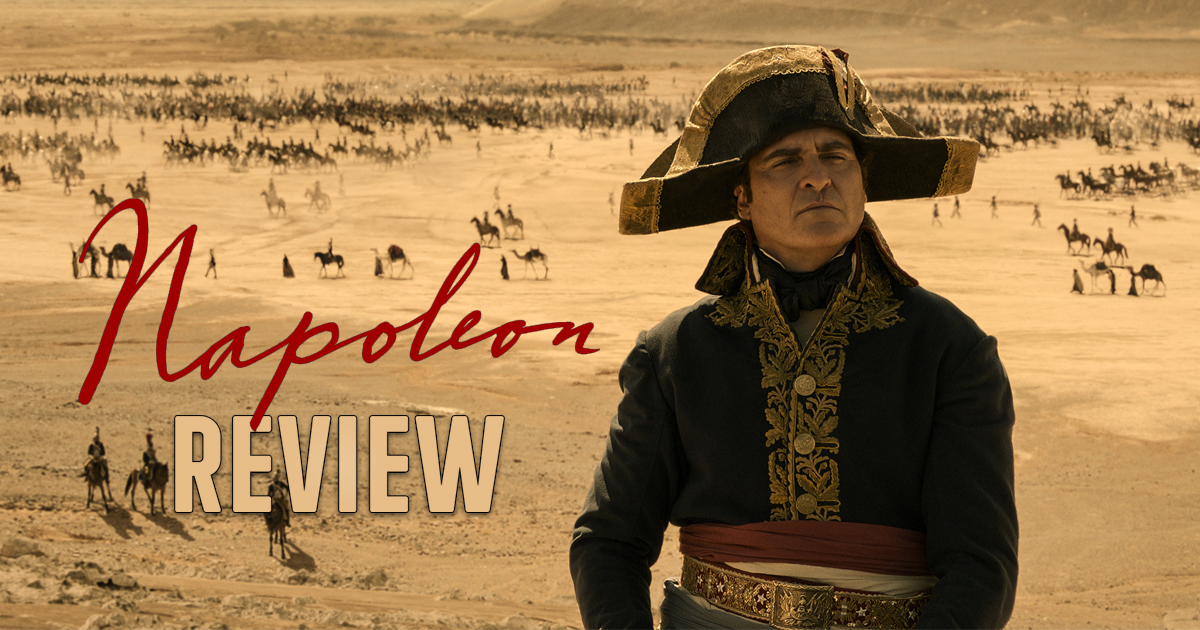Boring, pointless, and uninspired, Ridley Scott’s Napoleon attempts to side-step the traditional biopic pratfalls, but forgets to do anything remotely interesting or captivating.
Scott and screenwriter David Scarpa decide to forgo any background information on Napoleon, and focus on his rapid ascension from ambitious soldier to Emperor of Rome. Unfortunately, the forgot to give the audience the slightest reason to care.
Joaquin Phoenix stars as the titular Bonaparte, portrayed as a guy who doesn’t like loud noises, is insanely jealous of England, but also just took half an Ambien and is trying to fight off sleep. After being put in charge of one specific battle, he is automatically a general. Why did this happen? Because of reasons. He then quickly meets the widowed Josephine (Vanessa Kirby), and falls in love and gets married. Almost the moment they marry, Josephine begins taking a lover. Why does she do this? What drives her? Who knows, because the film doesn’t care.
The film’s posters promote the character as “he came from nothing, he conquered everything.” The “conquering” part makes sense. The “came from nothing” part doesn’t. There are two passed-over references to Napoleon being viewed as a “Corsican thug,” but that is quickly circumvented. The nation of France is in constant turmoil, but his emergence from relative obscurity just sort of happens. Why is he put in charge? Why is he so good at it? What makes him different? If the film knows, it isn’t about to tell the audience.
This goes on for two-and-a-half hours. Luckily, Napoleon’s famous battle victories are interspersed throughout the film. These battles are poorly formed, extremely violent, formless, but completely necessary. Otherwise, the audience would be lulled to sleep long before Bonaparte covers his ears (yet again) before another volley of cannon fire.
Signing up for what Phoenix brings is one thing, but he has shown in the past to be a fully-committed actor. This is certainly not the case here. He will occasionally yell ridiculous things in the face of English ambassadors and aggressively and unpassionately have sex with Josephine, but that’s about as animated as he gets. The rest of the time, he is barely interested in what is going on. This version of Napoleon is not the propulsive force of nature whose never-ending quest for power was his downfall. This version fell into becoming the Emperor just because. Instead of wanting to know more about the man after the film, I wish I knew less.
Some could say Kirby is the bright spot, but that’s like complimenting a side dish of a meal that made you physically ill. Josephine is just as confusing and unknowable a character as Napoleon. She seeks Napoleon out, but immediately sleeps around. She doesn’t want to be cast out, but also doesn’t want to stick around. Once she is sent away, she pines for Napoleon’s attention, despite never seeming to want it. Does Kirby have the best performance? Yes. But that doesn’t mean it registers among the cacophony of insane choices.
The popular criticisms of Napoleon have been mainly focused on accents and historical accuracy. I am by no means passionate about French history and the Napoleonic era to say what was correct one way or the other. As far as the accents, I am able to suspend my disbelief enough that it didn’t matter. On my list of complaints about the film, the accents didn’t crack the top 50.
Ridley Scott has made a litany of great films, but Napoleon certainly isn’t one of them. Nothing works and nothing registers. It’s a disaster from top to bottom.
Score: 2.0/5.0
How to Watch Napoleon
Napoleon opens wide in theaters on Wednesday, November 22nd
Your thoughts on the film
What do you think about Napoleon? Do you have thoughts you want to share? Join the conversation by commenting below or following us on X (formerly known as Twitter) @MoviesWeTexted.
Are you still trying to find something to watch this weekend? Check out Russell Miller’s thoughts on the new Emma Stone film Poor Things or Emerald Fennel’s Saltburn.
Want something more in depth? Read our interview with director Lila Schmitz about The Job of Songs.

